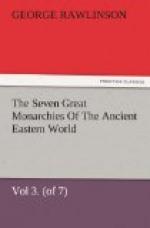The weakness of the Empire arose chiefly from its want of organization. Nicolas of Damascus, indeed, in the long passage from which our account of the struggle between Cyrus and Astyages has been taken, represents the Median Empire as divided, like the Persian, into a number of satrapies but there is no real ground for believing that any such organization was practised in Median times, or to doubt that Darius Hystaspis was the originator of the satrapial system. The Median Empire, like the Assyrian, was a congeries of kingdoms, each ruled by its own native prince, as is evident from the case of Persia, where Cambyses was not satrap, but monarch. Such organization as was attempted appears to have been clumsy in the extreme. The Medes (we are told) only claimed direct suzerainty over the nations immediately upon their borders; remoter tribes they placed under these, and looked to them to collect and remit the tribute of the outlying countries. It is doubtful if they called on the subject nations for any contingents of troops. We never hear of their doing so. Probably, like the Assyrians, they made their conquests with armies composed entirely of native soldiers, or of those combined with such forces as were sent to their aid by princes in alliance with them.
The weakness arising from this lack of organization was increased by a corruption of manners, which caused the Medes speedily to decline in energy and warlike spirit. The conquest of a great and luxurious empire by a hardy and simple race is followed, almost of necessity, by a deterioration in the character of the conquerors, who lose the warlike virtues, and too often do not replace them by the less splendid virtues of peace. This tendency, which is fixed in the nature of things, admits of being checked for a while, or rapidly developed, according to the policy and character of the monarchs who happen to occupy the throne. If the original conqueror is succeeded, by two or three ambitious and energetic princes, who engage in important wars and labor to extend their dominions at the expense of their neighbors, it will be some time before the degeneracy becomes marked. If, on the other hand, a prince of a quiet temper, self-indulgent, and studious of ease, come to the throne within a short time of the original conquests, the deterioration will be very rapid. In the present instance it happened that the immediate successor of the first conqueror was of a peaceful disposition, unambitious, and luxurious in his habits. During a reign which lasted at least thirty-five years he abstained almost wholly from military enterprises; and thus an entire generation of Medes grew up without seeing actual service, which alone makes the soldier. At the same time there was a general softening of manners. The luxury of the Court corrupted the nobles, who from hardy mountain chieftains, simple if not even savage in their dress and mode of life, became polite courtiers, magnificent in their apparel,




